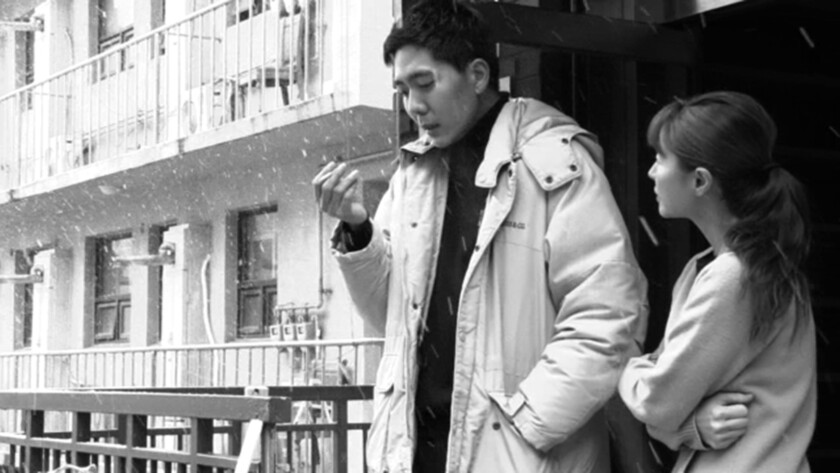Editor-in-chief Tomi Haffety considers one of her favourite directors’ latest meditative drama.
Why would anyone want to watch women talk about the differences between formal speech in Korean and German for five minutes, then sit in awkward silence for another two? As the cinema of Hong Sang-soo goes, this slow pace is expected. And to his fans, who have found themselves on one side of the divisive opinions regarding his work, it is welcomed and revered. A regular feature of the Berlinale, Sang-soo won the Silver Bear for best director last year with The Woman who Ran, and entered the competition yet again with his new, but very similar film, Introduction.
The consistency of Sang-soo’s work is notable, as one knows exactly what they are getting into with his films and although there is very little to them at first glance, there are depths of substance between the mundanities of the films. Introduction offers a brief perusal into the distinct mind of the Korean director, and it became clear even while it was playing that Sang-soo is offering more of the same. To me, this is not necessarily a negative. As with Rohmer’s depiction of the minutiae of normal life through drawn-out dialogue, there is an especially cathartic element to watching a conversation unfold between two people who don’t seem like they are acting, but rather like they were asked if their lives could be filmed for a day. Watching Introduction is not the archetypal cinema experience: it feels more like people-watching from a nearby window. The mostly improvised script (another trademark of the director) is a delicate mix between poetry and humdrum conversation topics that are suddenly made important simply through their inclusion in a feature film. Shot all in black and white and divided into chapters that are marked both by numbers and more symbolically by geographic location, the film explores the different relationships within a minimal set of characters: the plot is carried exclusively by interactions that never include more than four people in one shot.

Primarily introducing Young-ho (Shin Seok-ho), a young man on the brink of adulthood, as he visits his estranged father (Kim Young-ho). We see that his relationship with his parents is strained and his father has little time for him because he is seeing a patient at his clinic. This patient, an Old Actor (Ki Joo-bong), later becomes one of the central characters in the final third of the film, as it is revealed that he is involved in a relationship with Young-ho’s mother (Cho Yun-hee). Young-ho is impressionable and a hopeless romantic, at one point flying to Berlin to visit his girlfriend Juwon (Park Mi-so) while she is settling down there to start fashion school. Minimal time is given to introducing any of the characters in this short, yet complex film. Juwon’s interactions with both her mother (So Young-hwa) and the young painter with whom she is staying in Berlin (Kim Min-hee), symbolize the older generation imparting wisdom onto the young; Juwon’s childish shock at the Painter’s beauty proves her excitement to be introduced into adulthood. Along with lingering shots of faces throughout interminable conversations, as well as Sang-soo’s widely recognisable zoom shots, the emotions between characters is highlighted not only through dialogue predominantly through body language. Perpetually holding her hands in the pockets of her oversized coat, Juwon’s naivety is subtly examined in the dynamic between herself and Young-ho, who expresses a desire to move to Berlin to be with her. The candid expressions of young love are touching, if not the central plot of the feature.
At points I found myself questioning the meaning of the title: what is an ‘introduction’, if not an aptly abstract word that fits the obscure meaning of the film? There are introductions of different kinds throughout the feature: both the literal introduction of people to each other, such as Juwon’s introduction to the Painter, as well as the metaphorical introduction of young people into adulthood, as in the case of Young-ho and his opportunities that arise after a tense soju-fuelled dinner with the Old Actor test his decision-making skills. In the final few scenes, Juwon and Young-ho reunite and reflect on the past few years of being apart; this fleeting reconciliation serves as a poignant example of Sang-soo’s committed focus on human connection.
The organic process evident throughout all Sang-soo’s films creates a unique feeling of voyeurism that relies on the improvisation of the cast, who are given only a loose script to work with at the start of each shoot. Introduction is by no means his strongest film, as it lacks the concrete plotline of The Day After, or the distinct structure of The Woman who Ran. Ending with the same subtlety it began with, the film feels like the cinematic equivalent of taking the scenic route and arriving at the same destination; but in many ways, this slowness is what Sang-soo does best, and Introduction shows that he feels no reason to change his unmistakable style.




